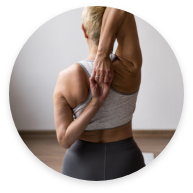Todos buscamos mantenernos saludables y radiantes, y el colágeno es un componente esencial que puede ayudarnos a lograrlo. Esta proteína es fundamental para la piel, las articulaciones y la salud en general. Sin embargo, cuando los niveles de colágeno disminuyen, nuestro cuerpo comienza a enviar señales de advertencia.
En este artículo, exploraremos los síntomas y las consecuencias de la falta de colágeno, lo que te ayudará a reconocer las señales que tu cuerpo podría estar enviando.
 El colágeno proporciona firmeza y elasticidad a la piel, siendo crucial para mantenerla tersa. Con el paso del tiempo, la producción natural de colágeno disminuye, lo que resulta en la aparición de arrugas, flacidez y líneas finas. Además, fortalece los huesos y articulaciones, brindándoles flexibilidad y resistencia para prevenir enfermedades como la osteoporosis y reducir la inflamación y el dolor en las articulaciones.
El colágeno proporciona firmeza y elasticidad a la piel, siendo crucial para mantenerla tersa. Con el paso del tiempo, la producción natural de colágeno disminuye, lo que resulta en la aparición de arrugas, flacidez y líneas finas. Además, fortalece los huesos y articulaciones, brindándoles flexibilidad y resistencia para prevenir enfermedades como la osteoporosis y reducir la inflamación y el dolor en las articulaciones.
En cuanto a la salud muscular, el colágeno es esencial, proporcionando fuerza y permitiendo que los músculos se contraigan y relajen adecuadamente. Su deficiencia puede contribuir a la debilidad muscular y la pérdida de masa muscular. Finalmente, el colágeno favorece la salud del cabello y las uñas, fortaleciendo y previniendo su caída y rotura.
Algunos de los síntomas que se indican en la falta de colágeno son:
| Área | Síntomas |
| Piel | Arrugas, flacidez, sequedad, líneas finas, piel fina y frágil. |
| Articulaciones | Dolor, rigidez, inflamación, dificultad para moverse. |
| Huesos | Debilidad, osteoporosis, mayor riesgo de fracturas. |
| Músculos | Debilidad, pérdida de masa muscular. |
| Cabello | Debilidad, caída del cabello, quebradizo. |
| Uñas | Frágiles, quebradizas. |
Para Identificar si tienes falta de colágeno, te aconsejamos acudir a un profesional para que realice una evaluación médica completa, a continuación encontrarás algunas de las señales más comunes:
Algunos de los principales signos son los problemas en la piel, arrugas pronunciadas, flacidez, sequedad extrema y pérdida de elasticidad son signos comunes de falta de colágeno, otro signo muy común suele ser el dolor articular y la rigidez, si experimentas dolor persistente en las articulaciones, rigidez al moverse o inflamación en áreas específicas, podría ser un indicador de una disminución en el colágeno articular, la edad es un factor importante, a medida que pasa el tiempo, la debilidad ósea y un mayor riesgo de fracturas, puede indicar una deficiencia de colágeno en los huesos, otros de los factores pueden ser debilitamiento muscular, problemas capilares y de uñas, problemas digestivos.

La falta de colágeno puede ser influenciada por varios factores, incluyendo la edad, donde la producción de colágeno disminuye naturalmente con el envejecimiento. A partir de los 25 años, esta producción comienza a disminuir a un ritmo de alrededor del 1% anual, la exposición al sol también juega un papel importante, ya que los rayos UV dañan las fibras de colágeno, acelerando el proceso de envejecimiento de la piel.
Una alimentación pobre en nutrientes esenciales para la producción de colágeno, como la vitamina C, el zinc y el cobre, puede contribuir a su déficit, además, el hábito de fumar daña el colágeno y reduce su producción en el organismo. El estrés crónico puede aumentar la producción de cortisol, una hormona que puede dañar el colágeno y afectar su producción.
Por último, algunas condiciones de salud, como la artritis reumatoide, pueden interferir con la producción adecuada de colágeno en el cuerpo.
La falta de colágeno puede tener un impacto significativo en tu salud y bienestar. Esto se manifiesta de diversas formas: envejecimiento prematuro, donde la piel se vuelve más fina, arrugada y flácida; problemas articulares, con mayor riesgo de dolor, rigidez e inflamación en las articulaciones; debilidad ósea, aumentando el riesgo de osteoporosis y fracturas; debilidad muscular, con disminución de la fuerza y la masa muscular; y problemas de cabello y uñas, donde el cabello se vuelve más fino y quebradizo, y las uñas se rompen con mayor facilidad.

Para mantener niveles saludables de colágeno, es importante cuidar tanto la alimentación como otros aspectos de estilo de vida. Consumir alimentos ricos en colágeno, como carne de res, pollo, pescado, huevos, gelatina y caldo de huesos, puede proporcionar los nutrientes necesarios para su producción en el cuerpo. Además, considera tomar suplementos de colágeno, que vienen en diferentes tipos como el colágeno hidrolizado, el colágeno marino y los tipos I, II y III, dependiendo de tus necesidades específicas.
Para proteger el colágeno existente en la piel, evita la exposición excesiva al sol y usa protector solar con un factor de protección solar (FPS) de 30 o superior. El tabaquismo también puede dañar el colágeno y reducir su producción, por lo que dejar de fumar es crucial para mantener niveles saludables. Además, controlar el estrés es importante, ya que el cortisol, una hormona liberada en respuesta al estrés, puede dañar el colágeno en el cuerpo. Incorporar técnicas de manejo del estrés, como la meditación o el yoga, puede ayudar a proteger la salud de tu colágeno y, en consecuencia, la salud de la piel, las articulaciones y los huesos.
Viteba es una marca comprometida con la salud y el bienestar, ofreciendo una gama de productos de alta calidad diseñados para promover una piel radiante, articulaciones saludables y un cuerpo en su mejor forma. En su línea de productos, destacan sus suplementos de colágeno, formulados con ingredientes cuidadosamente seleccionados para apoyar la producción natural de esta proteína esencial en el cuerpo.
Únete a nuestra Newsletter para experimentar el Efecto Premium. Obtendrás un 10% de descuento en la primera compra de nuestros productos.